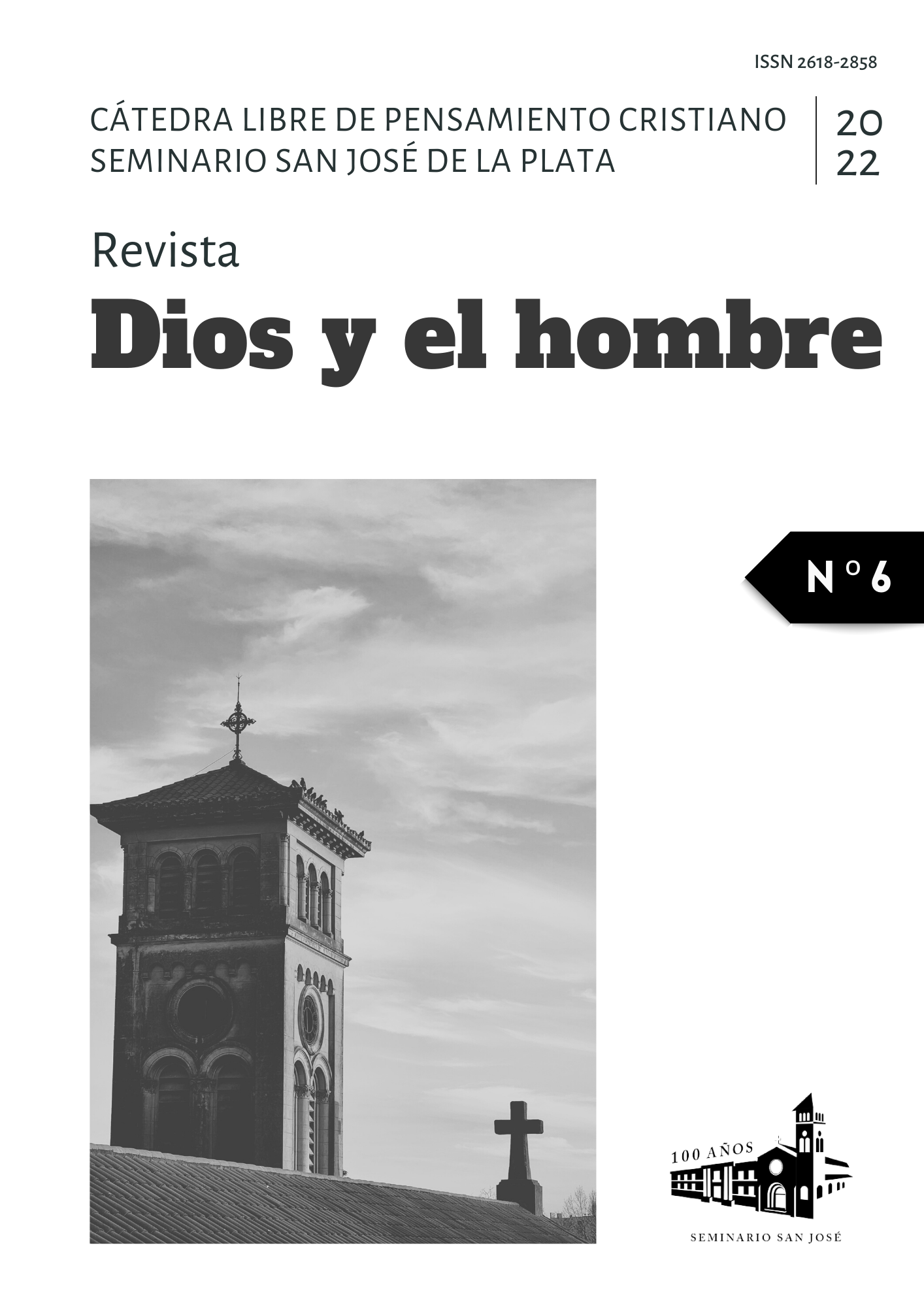Scrupulosity: A clinical approach
DOI:
https://doi.org/10.24215/26182858e089Keywords:
scrupulosity, obsessive-compulsive disorder, pastoral psychologyAbstract
Scrupulosity is a heterogeneus clinical presentation of obsessive-compulsive disorder concerning religious and moral issues. This article aims to review the current state of knowledge regarding this disorder and describe its more salient clinical features, worth to both mental health professionals and pastoral agents. Useful pastoral suggestions are made.
Downloads
References
Abramowitz, J. S., Huppert, J. D., Cohen, A. B., Tolin, D. F. y Cahill, S. P. (2002). Religious obsessions and compulsions in a no- clinical sample: the Penn Inventory of Scrupulosity (PIOS). Behaviour Research and Therapy, 40, 825-838.
American Psychiatric Association. (2013). Diagnostic and Statistical Manual of Mental Disorders, 5th ed. Washington DC: APA.
Barreiro, A. (2012). El desarrollo del juicio moral. In M. Carretero, y J. A. Castorina, Desarrollo cognitivo y educación II. Procesos del conocimiento y contenidos específicos (pp. 199-220). Quilmes: Paidós.
Birgegard, A. y Granqvist, P. (2004). The correspondence between attatchment to parents and God: three experiments using subliminal separation cues. Personality and Social Psychology Bulletin, 30, 1122-1135.
Bowlby, J. (2009). Una base segura. Aplicaciones clínicas de una teoría del apego. Buenos Aires: Paidós.
Buccholz, J. L., Abramowitz, J. S., Riemann, B. C., Reuman, L., Blakey, S. M., Leonard, R. C. y Thompson, K. A. (2019). Scrupulosity, religious affiliation and sympton presentation in obsessive compulsive disorder. Behavioural and Cognitive Psychotherapy, 47, 478-492.
Chappa, H. J. (2011). Tratamiento integrativo del Trastorno Obsesivo Compulsivo. Manual Práctico. Buenos Aires: Akadia.
Ciarrocchi, J. W. (1995). The doubting disease: help for scrupulosity and religious compulsions. Mahwah, United States: Paulist Press International.
Cobb, K. F. (2014). Understanding scrupulosity: psychopathological and catholic perspectives. Iowa, USA.
Cohen, A. B. (2009). Religion, likelihood of action, and the morality of mentality. International Journal for the Psychology of Religion, 13(4), 273-285.
Deacon, B. J., Vincent, A. M. y Zhang, A. R. (2013). Lutheran clergy members´ responses to scrupulosity: the effects of moral thought-action fusion and liberal vs. conservative denomination. Journal of Obsessive-Compulsive and Related Disorders, 2, 71-77.
Deacon, B. y Nelson, E. A. (2008). On the nature and treatment of scrupulosity. Pragmatic Case Study in Psychotherapy, 4, 39-53.
Fallon, B. A., Liebowitz, M. R., Hollander, E., Schneier, F. R., Campeas, R. B., Fairbanks, J., . . . y Sandberg, D. (1990). The pharmacotherapy of moral or religious scrupulosity. The Journal of Clinical Psychiatry, 51 (12), 517-521.
García-Soriano, G., Carrió, C. y Belloch, A. (2016). Psicopatología de las compulsiones de lavado en el trastorno obsesivo-compulsivo: no todos los pacientes lavan por los mismos motivos. Revista de psicopatología y psicología clínica, 21 (3), 219-230.
Granqvist, P., Mikulincer, M. y Shaver, P. R. (2010). Religion as attachment: normative processes and individual differences. Personality and Social Psychology Review, 14 (1), 49-59.
Greenberg, D. y Huppert, J. D. (2010). Scrupulosity: an unique subtype of obsessivecompulsive disorder. Current Psychiatry Reports, 12, 282-289.
Greenberg, D. y Shefler, G. (2002). Obsessive compulsive disorder in ultra-orthodox Jewish patients: a comparison of reliigious and non-religious symptoms. Psychology and Psychotherapy: Theory, Research adn Practice, 75, 123-130.
Greenberg, D. y Witztum, E. (1991). Problems in the treatment of religious patients. American Journal of Psychotherapy, XLV (4), 554-565.
Greenberg, D., Witztum, E. y Pisante, J. (1987). Scrupulosity: religious attitudes and clinical presentations. British Journal of Medical Psychology, 60, 29-37.
Hathaway, W. L. (2003). Clinically significant religious impairment. Mental health, religion & culture, 6 (2), 113-129.
Hepworth, M., Simonds, L. M. y Marsh, R. (2010). Catholic priests' conceptualisations of scrupulosity: a grounded theory analysis. Mental health, religion and culture, 1, 1-16.
Huppert, J. D. y Siev, J. (2010). Treating scrupulosity in religious individuals using cognitive-behavioral therapy. Cognitive and Behavioral Practice, 17, 382-392.
Krzanowska, E. y Kuleta, M. (2017). From anxiety to compulsivity -a review of changes to OCD classification in DSM-5 and ICD-11. Archives of Psychiatry and Psychotherapy, 3, 7-15.
Mataix-Cols, D., do Rosario-Campos, M. C. y Leckman, J. F. (2005). A multidimensional model of obsessive-compulsive disorder. The American Journal of Psychiatry, 162, 228-238.
McKay, D., Abramowitz, J. S., Calamari, J. E., Kyrios, M., Radomsky, A., Sookman, D., . . . y Wilhelm, S. (2004). A critical evaluation of obsessive-compulsive disorder subtypes: symptons vs. mechanisms. Clinical Psychology Review, 24, 283-313.
Miller, C. H. y Hedges, D. W. (2008). Scrupulosity disorder: an overview and introductory analysis. Journal of Anxiety Disorders, 22, 1042-1058.
Moliner, M. (1994). Diccionario de uso del español, tomo I. Madrid: Gredos.
Nelson, E. A., Abramowitz, J. S., Whiteside, S. P. y Deacon, B. J. (2006). Scrupulosity in patients with obsessive-compulsive disorder: relationship to clinical and cognitive phenomena. Journal of Anxiety Disorders, 20, 1071-1086.
Okasha, A. (2004). OCD in egyptian adolescentes: the effect of culture and religion. Psychiatric Times, 21 (5), 1-5.
Okasha, A., Saad, A., Khalil, A. H., Seif El Dawla, A. y Yehia, N. (1994). Phenomenology of obsessive-compulsive disorder: a transcultural study. Comprehensive Psychiatry, 35 (3), 191-197.
Park, C. L. y Slattery, J. M. (2013). Religion, spirituality and mental health. In R. F. Paloutzian, & C. L. Park, Handbook of the psychology of religion and spirituality. New York: Guilford Press.
Pérez Rivera, R. y Borda, T. (2013). Espectro del Trastorno Obsesivo-Compulsivo, un enfoque dimensional del Trastorno Obsesivo-Compulsivo. Revista Latinoamericana de Psiquiatría, núm 1, vol. 12, 31-37.
Pérez Rivera, R. y Borda, T. (2017). Trastorno obsesivo compulsivo. Buenos Aires: Akadia.
Rassin, E. y Koster, E. (2003). The correlation between action-fusion and religiosity in a normal sample. Behaviour Research and Therapy, 41, 361-368.
Richert, R. A. y Granqvist, P. (2013). Religious and spritual development in childhood. In R. F. Paloutzian, & C. L. Park, Handbook of the psychology of religion and spirituality. New York: Guilford Press.
Santa, T. M. (2017). Understanding scrupulosity. Questions and encouragement. USA: Liguori.
Siev, J. y Cohen, A. B. (2007). Is thought-action fusion related to religiosity? Differences between christians and jews. Behaviour Research and Therapy, 45, 829-837.
Siev, J., Baer, L. y Minichiello, W. E. (2011). Obsessive-compulsive disorder with predominantly scrupulous symptoms: clinical and religious characteristics. Journal of clinical psychology, vol. 67 (12), 1188-1196.
Siev, J., Steketee, G., Fama, J. M. y Wilhelm, S. (2011). Cognitive and clinical characteristics of sexual and religious obsessions. Journal of Cognitive Psychoterapy: An Internationa Quarterly, 5 (3), 167-176.
Tek, C. y Ulug, B. (2001). Religiosity and religious obsessions in obsessive-compulsive disorder. Psychiatry Research,104, 99-108.
Weisner, W. M. y Riffel, P. A. (1960, mayo 9-13). Scrupulosity: religion and obsessive compulsive behavior in children. Atlantic City, N.J., EEUU.
Witzig, T. F. y Pollard, C. A. (2013). Obsessional beliefs, religious beliefs, and scrupulosity among fundamental protestant christians. Journal of Obsessive Compulsive and Related Disorders, 2 , 331-337.
Downloads
Published
Issue
Section
License
Copyright (c) 2022 José Pablo Ducis Roth

This work is licensed under a Creative Commons Attribution-NonCommercial-ShareAlike 4.0 International License.
Política general de la revista (desde 2018)
La aceptación de un original por parte de la revista implica la cesión no exclusiva de los derechos patrimoniales de los/as autores/as en favor del editor, quien permite la reutilización, luego de su edición (postprint), bajo una Licencia Creative Commons Atribución-NoComercial-CompartirIgual 4.0 Internacional (CC BY-NC-SA 4.0).
Acorde a estos términos, el material se puede compartir (copiar y redistribuir en cualquier medio o formato) y adaptar (remezclar, transformar y crear a partir del material otra obra), siempre que a) se cite la autoría y la fuente original de su publicación (revista y URL de la obra), b) no se use para fines comerciales y c) se mantengan los mismos términos de la licencia.
La cesión de derechos no exclusivos implica que luego de su edición (postprint) en Dios y el Hombre los/as autores/as pueden publicar su trabajo en cualquier idioma, medio y formato; en tales casos, se solicita que se consigne que el material fue publicado originalmente en esta revista.
Tal cesión supone, también, la autorización de los/as autores/as para que el trabajo sea cosechado por SEDICI, el repositorio institucional de la Universidad Nacional de La Plata, y sea difundido en las bases de datos que el equipo editorial considere adecuadas para incrementar la visibilidad de la publicación y de sus autores/as.
Asimismo, la revista incentiva a los/as autores/as para que luego de su publicación en Dios y el Hombre depositen sus producciones en otros repositorios institucionales y temáticos, bajo el principio de que ofrecer a la sociedad la producción científica y académica sin restricciones contribuye a un mayor intercambio del conocimiento global.



















